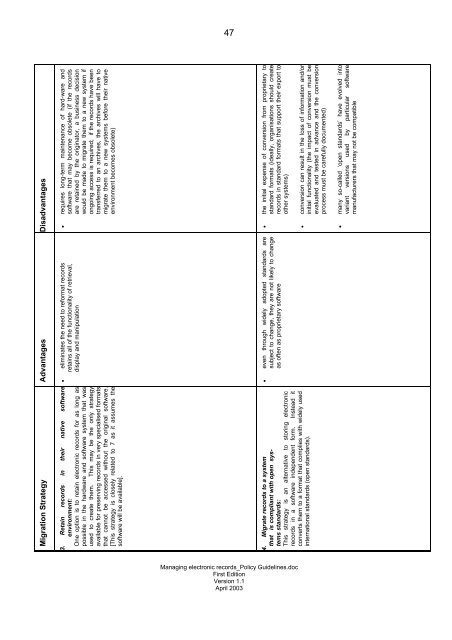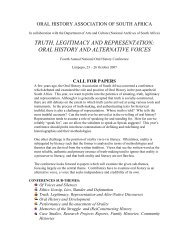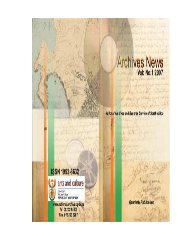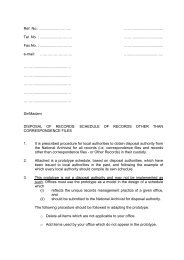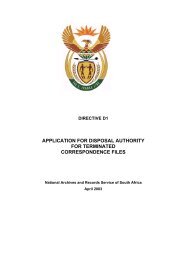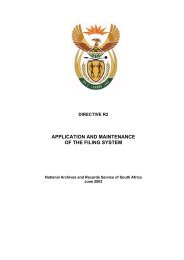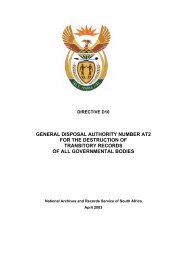managing electronic records in governmental bodies - National ...
managing electronic records in governmental bodies - National ...
managing electronic records in governmental bodies - National ...
You also want an ePaper? Increase the reach of your titles
YUMPU automatically turns print PDFs into web optimized ePapers that Google loves.
47<br />
Migration Strategy<br />
3.<br />
Reta<strong>in</strong> <strong>records</strong> <strong>in</strong> their native software<br />
environment:<br />
One option is to reta<strong>in</strong> <strong>electronic</strong> <strong>records</strong> for as long as<br />
possible <strong>in</strong> the hardware and software system that was<br />
used to create them. This may be the only strategy<br />
available for preserv<strong>in</strong>g <strong>records</strong> <strong>in</strong> very specialised formats<br />
that cannot be accessed without the orig<strong>in</strong>al software.<br />
[This strategy is closely related to 7 as it assumes the<br />
software will be available].<br />
4. Migrate <strong>records</strong> to a system<br />
that is compliant with open systems<br />
standards:<br />
This strategy is an alternative to stor<strong>in</strong>g <strong>electronic</strong><br />
<strong>records</strong> <strong>in</strong> a software <strong>in</strong>dependent form. Instead it<br />
converts them to a format that complies with widely used<br />
<strong>in</strong>ternational standards (open standards).<br />
Advantages<br />
• elim<strong>in</strong>ates the need to reformat <strong>records</strong><br />
reta<strong>in</strong>s all of the functionality of retrieval,<br />
display and manipulation<br />
• even through widely adopted standards are<br />
subject to change, they are not likely to change<br />
as often as proprietary software<br />
Disadvantages<br />
• requires long-term ma<strong>in</strong>tenance of hard-ware and<br />
software that may become obsolete (if the <strong>records</strong><br />
are reta<strong>in</strong>ed by the orig<strong>in</strong>ator, a bus<strong>in</strong>ess decision<br />
would be made to migrate them to a new system if<br />
ongo<strong>in</strong>g access is required; if the <strong>records</strong> have been<br />
transferred to an archives, the archives will have to<br />
migrate them to a new systems before their native<br />
environment becomes obsolete)<br />
• the <strong>in</strong>itial expense of conversion from proprietary to<br />
standard formats (ideally, organisations should create<br />
<strong>records</strong> <strong>in</strong> standard formats that support their export to<br />
other systems)<br />
• conversion can result <strong>in</strong> the loss of <strong>in</strong>formation and/or<br />
<strong>in</strong>itial functionality (the impact of conversion must be<br />
evaluated and tested <strong>in</strong> advance and the conversion<br />
process must be carefully documented)<br />
• many so-called ‘open standards’ have evolved <strong>in</strong>to<br />
variant versions used by particular software<br />
manufacturers that may not be compatible<br />
Manag<strong>in</strong>g <strong>electronic</strong> <strong>records</strong>_Policy Guidel<strong>in</strong>es.doc<br />
First Edition<br />
Version 1.1<br />
April 2003


